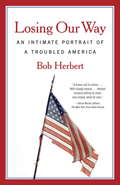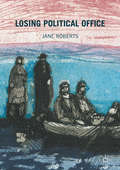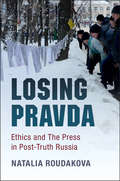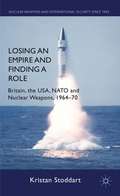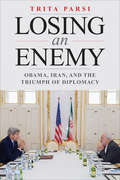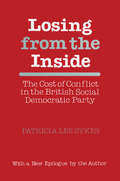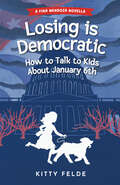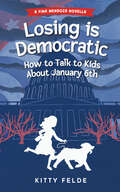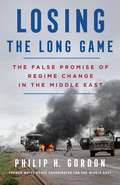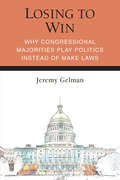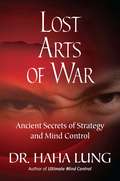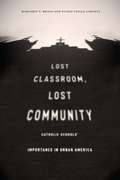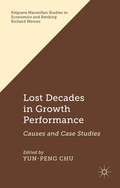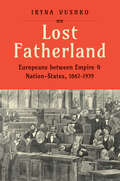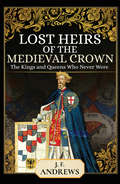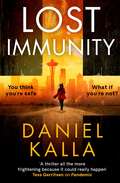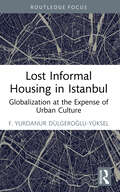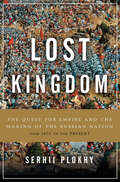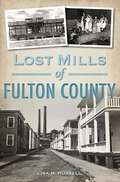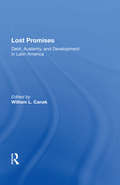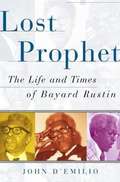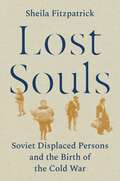- Table View
- List View
Losing Our Way
by Bob HerbertFrom longtime New York Times columnist Bob Herbert comes a wrenching portrayal of ordinary Americans struggling for survival in a nation that has lost its wayIn his eighteen years as an opinion columnist for The New York Times, Herbert championed the working poor and the middle class. After filing his last column in 2011, he set off on a journey across the country to report on Americans who were being left behind in an economy that has never fully recovered from the Great Recession. The portraits of those he encountered fuel his new book, Losing Our Way. Herbert's combination of heartrending reporting and keen political analysis is the purest expression since the Occupy movement of the plight of the 99 percent. The individuals and families who are paying the price of America's bad choices in recent decades form the book's emotional center: an exhausted high school student in Brooklyn who works the overnight shift in a factory at minimum wage to help pay her family's rent; a twenty-four-year-old soldier from Peachtree City, Georgia, who loses both legs in a misguided, mismanaged, seemingly endless war; a young woman, only recently engaged, who suffers devastating injuries in a tragic bridge collapse in Minneapolis; and a group of parents in Pittsburgh who courageously fight back against the politicians who decimated funding for their children's schools. Herbert reminds us of a time in America when unemployment was low, wages and profits were high, and the nation's wealth, by current standards, was distributed much more equitably. Today, the gap between the wealthy and everyone else has widened dramatically, the nation's physical plant is crumbling, and the inability to find decent work is a plague on a generation. Herbert traces where we went wrong and spotlights the drastic and dangerous shift of political power from ordinary Americans to the corporate and financial elite. Hope for America, he argues, lies in a concerted push to redress that political imbalance. Searing and unforgettable, Losing Our Way ultimately inspires with its faith in ordinary citizens to take back their true political power and reclaim the American dream.From the Hardcover edition.
Losing Political Office
by Jane RobertsBased on in-depth interviews conducted with British politicians, this book analyses the different impacts of leaving political office. Representative democracy depends on politicians exiting office, and yet while there is considerable interest in who stands for and gains office, there is curiously little discussed about this process. Jane Roberts seeks to address this gap by asking: What is the experience like? What happens to politicians as they make the transition from office? What is the impact on their partners and family? Does it matter to anyone other than those immediately affected? Are there any wider implications for our democratic system? This book will appeal to academics in the fields of leadership, political science, public management and administration and psychology. It will also be of interest to elected politicians in central, devolved and local government (current and former), policy makers and political commentators, and more widely, the interested general reader.
Losing Pravda: Ethics and The Press in Post-Truth Russia
by Natalia RoudakovaWhat happens when journalism is made superfluous? Combining ethnography, media analysis, moral and political theory this book examines the unravelling of professional journalism in Russia over the past twenty-five years, and its effects on society. It argues that, contrary to widespread assumptions, late Soviet-era journalists shared a cultural contract with their audiences, which ensured that their work was guided by a truth-telling ethic. Post-communist economic and political upheaval led not so much to greater press freedom as to the de-professionalization of journalism, as journalists found themselves having to monetize their truth-seeking skills. This has culminated in a perception of journalists as political prostitutes, or members of the 'second oldest profession', as they are commonly termed in Russia. Roudakova argues that this cultural shift has fundamentally eroded the value of truth-seeking and telling in Russian society.
Losing an Empire and Finding a Role
by Kristan StoddartThis book sheds fresh light on developments in British nuclear weapons policy between October 1964, when the Labour Party came back into power under Harold Wilson following a thirteen year absence, and June 1970 when the Conservative government of Edward Heath was elected.
Losing an Enemy: Obama, Iran, and the Triumph of Diplomacy
by Trita ParsiThe definitive book on President Obama&’s historic nuclear deal with Iran from the U.S. foreign policy expert and acclaimed author of Treacherous Alliance. In Losing an Enemy, Middle East policy expert Trita Parsi examines President Obama&’s strategy toward Iran&’s nuclear program and reveals how the historic agreement of 2015 broke the persistent stalemate in negotiations that had blocked earlier efforts. The Joint Comprehensive Plan of Action, commonly known as the Iran nuclear deal, accomplished two major feats in one stroke: it averted the threat of war with Iran and prevented the possibility of an Iranian nuclear bomb. Parsi advised the Obama White House throughout the talks and had access to decision-makers and diplomats on the U.S. and Iranian sides alike. With his unique insight, he examines every facet of a triumph that could become as important and consequential as Nixon&’s rapprochement with China. Drawing from more than seventy-five in-depth interviews with key decision-makers, including Iran's Foreign Minister Javad Zarif and U.S. Secretary of State John Kerry, this is the first authoritative account of President Obama&’s signature foreign policy achievement. "A detailed and gripping account of the 22 months of negotiations over Iran&’s nuclear program that resulted in the 2015 deal."—John Waterbury, Foreign Affairs
Losing from the Inside: Cost of Conflict in the British Social Democratic Party
by Patricia Lee SykesThis book focuses on the consequences of internal conflict for electoral competition and demonstrates why the Social Democratic Party (SDP), in alliance with the Liberals, "lost from the inside" during two general election campaigns in Great Britain.
Losing is Democratic: How to Talk to Kids About January 6th (The Fina Mendoza Mysteries)
by Kitty FeldeTeachers, Librarians, Homeschoolers: enhance your comprehensive civics education resources with supplemental curriculum materials. Ten-year-old Fina Mendoza takes readers behind-the-scenes on Capitol Hill as she learns about American democracy, the electoral process, the U.S. legislative branch, and the events of January 6, 2021. Losing is Democratic: How to Talk to Kids About January 6th features a Latina protagonist of spunk and smarts whose congressman father is on the House floor on January 6th. Fina Mendoza, our amateur detective, is in the middle of an investigation to find out who stole the 5th grade's pizza. But all thoughts of detection go out the window as she, her older sister Gabby, and grandmother Abuelita watch on television as a mob breaks into the Capitol. Is Papa okay? Most of Fina's classmates have parents who work inside that building as well. Their teacher calms their fears and the next day, turns the event into a teaching opportunity, looking back at the bitter presidential election rivalry between Thomas Jefferson and John Adams. The students discuss the importance of winning and losing, whether it's in a baseball game, a reading competition, or an election. FREE DOWNLOADABLE CURRICULUM AVAILABLE: Build reading skills while teaching integrated lessons in ELA, social studies, and history designed for grades 3-5 Common Core Standards, NCSS curriculum standards, C3 Social Studies Readiness, and California Public Schools' History-Social Science content standards. Promote deeper learning through active engagement, reading comprehension, content knowledge, and creative and analytical thinking. Designed for use by elementary school teachers, parents, homeschoolers, and community educators. Non-political presentation of the events of January 6th, appropriate for elementary age students. INTERACTIVE COMPONENTS AND MULTIMEDIA SOURCES: Helps address students' diverse learning needs and supports the use of technology in the classroom. The Fina Mendoza Mysteries FREE podcast is based on the books and current events. The "January 6th: Losing is Democratic" 2-part episode is the basis for the book, Losing is Democratic. The "Facts Behind the Fiction" blog offers historical context for both the books and podcast. Introduce civics to your students with The Fina Mendoza Mysteries series.THE FINA MENDOZA MYSTERIES SERIES: Book 1 – Welcome to Washington Fina Mendoza Book 2 – State of the Union: A Fina Mendoza Mystery Book 3 – Snake in the Grass (coming Fall 2024) ALSO AVAILABLE IN SPANISH: Book 1 – Bienvenida a Washington Fina Mendoza Book 2 – Estado de la UniÓn (coming Summer 2024) Book 3 – Serpiente en la Hierba (coming Spring 2025) THE WEST WING MEETS NANCY DREW... For fans of The Secret Lake, Greenglass House, The Mysterious Benedict Society and The National Park Mystery Series as well as classic children's detective series like Boxcar Children, Encyclopedia Brown, and Hardy Boys.
Losing is Democratic: How to Talk to Kids About January 6th (The Fina Mendoza Mysteries)
by Kitty FeldeA great book and series for CIVICS EDUCATION!Losing is Democratic: How to Talk to Kids About January 6th features a Latina protagonist of spunk and smarts whose congressman father is on the House floor on January 6th.Teachers, Librarians, and Homeschoolers, THE FINA MENDOZA MYSTERIES SERIES of Books, Podcasts, Teacher' s Guides, and "Facts Behind the Fiction" newsletter/blog provide a multidisciplinary approach to civics education for elementary school readers. As our amateur detective solves mysteries on Capitol Hill, she and your students learn about American democracy, the electoral process, civic engagement and the events of January 6, 2021.SYNOPSIS: Fina is in the middle of an investigation to find out who stole the 5th grade's pizza— the prize for winning a reading competition. But all thoughts of detection go out the window as she, her older sister Gabby, and grandmother Abuelita watch on television as a mob breaks into the Capitol. Is Papa okay? Most of Fina's classmates have parents who work inside that building as well. Their teacher calms their fears and the next day, turns the event into a teaching opportunity, looking back at the bitter presidential election rivalry between Thomas Jefferson and John Adams. The students discuss the importance of winning and losing, whether it's in a baseball game, a reading competition, or an election.THE WEST WING meets NANCY DREWFREE DOWNLOADABLE CURRICULUM AVAILABLE:Build reading skills while teaching integrated lessons in:– ELA, social studies, and history designed for grades 3-5 Common Core Standards– NCSS curriculum standards, C3 Social Studies Readiness– California Public Schools' History-Social Science content standardsPromote deeper learning through:– active engagement– reading comprehension– content knowledge– creative and analytical thinkingDesigned for use by elementary school teachers, parents, homeschoolers, scout leaders, and community educators.INTERACTIVE COMPONENTS AND MULTIMEDIA SOURCES:Helps address students' diverse learning needs and supports the use of technology in the classroom.The Fina Mendoza Mysteries FREE podcast is based on the books and current events. The "Facts Behind the Fiction" blog and newsletter offer historical and civics context for both the books and podcast.Introduce civics to your students with The Fina Mendoza Mysteries series!THE FINA MENDOZA MYSTERIES SERIES:Book 1 – Welcome to Washington Fina MendozaBook 2 – State of the Union: A Fina Mendoza MysteryBook 3 – Snake in the Grass (coming Spring 2025)Podcast – The Fina Mendoza MysteriesALSO AVAILABLE IN SPANISH:Book 1 – Bienvenida a Washington Fina MendozaBook 2 – Estado de la Unió n: Un Misterio de Fina MendozaBook 3 – Serpiente en la Hierba (Autumn 2025)For fans of The Secret Lake, Greenglass House, and "The Mysterious Benedict Society" and "National Park Mystery Series" as well as classic books and detective series like The Westing Game, Boxcar Children, Encyclopedia Brown, The Virginia Mysteries, and Hardy Boys.
Losing the Long Game: The False Promise of Regime Change in the Middle East
by Philip H. GordonThe definitive account of how regime change in the Middle East has proven so tempting to American policymakers for decades—and why it always seems to go wrong."Must reading—by someone who saw it first-hand—for all interested in America’s foreign policy and its place in the world.”—Robin Wright Since the end of World War II, the United States has set out to oust governments in the Middle East on an average of once per decade—in places as diverse as Iran, Iraq, Afghanistan (twice), Egypt, Libya, and Syria. The reasons for these interventions have also been extremely diverse, and the methods by which the United States pursued regime change have likewise been highly varied, ranging from diplomatic pressure alone to outright military invasion and occupation. What is common to all the operations, however, is that they failed to achieve their ultimate goals, produced a range of unintended and even catastrophic consequences, carried heavy financial and human costs, and in many cases left the countries in question worse off than they were before.Philip H. Gordon's Losing the Long Game is a thorough and riveting look at the U.S. experience with regime change over the past seventy years, and an insider’s view on U.S. policymaking in the region at the highest levels. It is the story of repeated U.S. interventions in the region that always started out with high hopes and often the best of intentions, but never turned out well. No future discussion of U.S. policy in the Middle East will be complete without taking into account the lessons of the past, especially at a time of intense domestic polarization and reckoning with America's standing in world.
Losing to Win: Why Congressional Majorities Play Politics Instead of Make Laws (Legislative Politics And Policy Making)
by Jeremy GelmanMost everyone, voters, political scientists, even lawmakers, think Congress is dysfunctional. Instead of solving problems, Democrats and Republicans spend their time playing politics. These days Capitol Hill seems more a place to bicker, not to pass laws. The reality is more complicated. Yes, sometimes Congress is broken. But sometimes it is productive. What explains this variation? Why do Democrats and Republicans choose to legislate or score political points? And why do some issues become so politicized they devolve into partisan warfare, while others remain safe for compromise? Losing to Win answers these questions through a novel theory of agenda-setting. Unlike other research that studies bills that become law, Jeremy Gelman begins from the opposite perspective. He studies why majority parties knowingly take up dead-on-arrival (DOA) bills, the ideas everyone knows are going to lose. In doing so, he argues that congressional parties’ decisions to play politics instead of compromising, and the topics on which they choose to bicker, are strategic and predictable. Gelman finds that legislative dysfunction arises from a mutually beneficial relationship between a majority party in Congress, which is trying to win unified government, and its allied interest groups, which are trying to enact their policies. He also challenges the conventional wisdom that DOA legislation is political theater. By tracking bills over time, Gelman shows that some former dead-on-arrival ideas eventually become law. In this way, ideas viewed as too extreme or partisan today can produce long-lasting future policy changes. Through his analysis, Gelman provides an original explanation for why both parties pursue the partisan bickering that voters find so frustrating. He moves beyond conventional arguments that our discordant politics are merely the result of political polarization. Instead, he closely examines the specific circumstances that give rise to legislative dysfunction. The result is a fresh, straightforward perspective on the question we have all asked at some point, “Why can’t Democrats and Republicans stop fighting and just get something done?”
Lost Art of War: Ancient Secrets of Strategy and Mind Control
by Lung Dr HahaSun Tzu's The Art of War is an acknowledged masterpiece--for the general reader. Yet the deeper truths of strategy and mind manipulation have been, until now, known only to true scholars dedicated to deciphering illegible scrolls and mastering the nuances of lost languages. Now, Dr. Haha Lung has at last gathered and fully translated these teachings from the shadows of history--the truly dangerous wisdom of the lesser-known masters--and presents them here for those daring, perhaps unwisely, to attain a higher level of dominance. You'll discover: The 12 Cuts: Voritomo's Art of War The War Scroll of Spartacus Musashi's 6 Ways to be VictoriousThe 99 Truths: Hannibal's Black Art of War And much moreBE ADVISED: For academic study ONLY; publisher assumes NO responsibility for content use/misuse. Dr. Haha Lung is the author of more than a dozen books on martial arts, including Ultimate Mind Control, Mind Penetration, Mind Fist, The Nine Halls of Death, Assassin!, Mind Manipulation, Knights of Darkness, and Mind Control: The Ancient Art of Psychological Warfare.
Lost Classroom, Lost Community: Catholic Schools' Importance in Urban America
by Margaret F. Brinig Nicole Stelle GarnettIn the past two decades in the United States, more than 1,600 Catholic elementary and secondary schools have closed, and more than 4,500 charter schools--public schools that are often privately operated and freed from certain regulations--have opened, many in urban areas. With a particular emphasis on Catholic school closures, Lost Classroom, Lost Community examines the implications of these dramatic shifts in the urban educational landscape. More than just educational institutions, Catholic schools promote the development of social capital--the social networks and mutual trust that form the foundation of safe and cohesive communities. Drawing on data from the Project on Human Development in Chicago Neighborhoods and crime reports collected at the police beat or census tract level in Chicago, Philadelphia, and Los Angeles, Margaret F. Brinig and Nicole Stelle Garnett demonstrate that the loss of Catholic schools triggers disorder, crime, and an overall decline in community cohesiveness, and suggest that new charter schools fail to fill the gaps left behind. This book shows that the closing of Catholic schools harms the very communities they were created to bring together and serve, and it will have vital implications for both education and policing policy debates.
Lost Decades in Growth Performance
by Yun-Peng ChuThere have been many noticeable incidents of 'lost decades' in economic growth, occurring in countries across the world. It has been found that in many economies, the lost decade phenomenon persists, even after the conventional set of contributing factors such as per capita income, fertility rate, life expectancy, rule of law, educational attainment, ratio of investment to national income, and openness have been taken into account. This book explains where and how these lost decades in economic growth occur in the world. The authors identify that dominant macroeconomic factors contributing to their occurrence are an abnormal supply of credits relative to national income, and poor demand management. The study pays special attention to the cases of Japan, South Korea and Taiwan, exploring their specific cases and analyzing contributing factors. While Japan suffered from excessive credit prior to the bubble bursting, and from insufficient domestic demand subsequently, Korea's growth has been stunted through structural imbalances between and within industries, as well as through changes in the orientation of public policies from growth to equality. Adversely, reduced economic growth in Taiwan has led from its populism-ridden democracy and mass media, as well as from internal disputes over national identity. Lost Decades in Growth Performance provides a revealing insight into the factors affecting economic growth across the world, and will be an invaluable resource for anyone with an interest in global and Asian economics. It also offers a fundamental source of reference for students and academics in general equilibrium models, economic development and East Asian economies.
Lost Fatherland: Europeans between Empire and Nation-States, 1867-1939
by Iryna VushkoHow the demise of the Habsburg Empire, postwar sovereignty, and new diplomatic frontiers shaped the nature of citizenship, identity, and belonging across Europe This book is a collective portrait of twenty-one key statesmen who came of age during the Habsburg Empire. They include the cofounder of Austro-Marxism and the Austrian republic&’s first foreign minister, the cofounder of the European Union after the Second World War, the founder of the Communist Party of Czechoslovakia, and Mussolini&’s ambassador to Vienna. Some survived the First World War and the resulting geographical divisions in their homelands, and some went on to serve in politics and governments throughout Europe. Taken together, the stories of these men offer readers a window on broad issues of European history in the late nineteenth and early twentieth centuries—chiefly, how an imperial heritage, a shared vision of statehood and nationalism, and a commitment to peaceful conflict resolution helped establish enduring loyalty and unity despite the geographical fault lines resulting from the war. As Iryna Vushko explains, their stories also offer an increasingly nuanced understanding of the achievements and failures of the Habsburg Empire.
Lost Heirs of the Medieval Crown: The Kings and Queens Who Never Were
by J. F. Andrews&“A fascinating study of the also-rans and almost-made-its of medieval history . . . Beautifully written and well researched, it is an engaging read.&” —History . . . The Interesting Bits! When William the Conqueror died in 1087, he left the throne of England to William Rufus . . . his second son. The result was an immediate war as Rufus&’s elder brother Robert fought to gain the crown he saw as rightfully his; this conflict marked the start of 400 years of bloody disputes as the English monarchy&’s line of hereditary succession was bent, twisted and finally broken when the last Plantagenet king, Richard III, fell at Bosworth in 1485. The Anglo-Norman and Plantagenet dynasties were renowned for their internecine strife, and in Lost Heirs we will unearth the hidden stories of fratricidal brothers, usurping cousins and murderous uncles; the many kings—and the occasional queen—who should have been but never were. History is written by the winners, but every game of thrones has its losers too, and their fascinating stories bring richness and depth to what is a colorful period of history. King John would not have gained the crown had he not murdered his young nephew, who was in line to become England&’s first King Arthur; Henry V would never have been at Agincourt had his father not seized the throne by usurping and killing his cousin; and as the rival houses of York and Lancaster fought bloodily over the crown during the Wars of the Roses, life suddenly became very dangerous indeed for a young boy named Edmund. &“A journey through the minefield of opposing factions fighting for the crown of England.&” —Books Monthly
Lost Heirs of the Medieval Crown: The Kings and Queens Who Never Were
by J. F. Andrews&“A fascinating study of the also-rans and almost-made-its of medieval history . . . Beautifully written and well researched, it is an engaging read.&” —History . . . The Interesting Bits! When William the Conqueror died in 1087, he left the throne of England to William Rufus . . . his second son. The result was an immediate war as Rufus&’s elder brother Robert fought to gain the crown he saw as rightfully his; this conflict marked the start of 400 years of bloody disputes as the English monarchy&’s line of hereditary succession was bent, twisted and finally broken when the last Plantagenet king, Richard III, fell at Bosworth in 1485. The Anglo-Norman and Plantagenet dynasties were renowned for their internecine strife, and in Lost Heirs we will unearth the hidden stories of fratricidal brothers, usurping cousins and murderous uncles; the many kings—and the occasional queen—who should have been but never were. History is written by the winners, but every game of thrones has its losers too, and their fascinating stories bring richness and depth to what is a colorful period of history. King John would not have gained the crown had he not murdered his young nephew, who was in line to become England&’s first King Arthur; Henry V would never have been at Agincourt had his father not seized the throne by usurping and killing his cousin; and as the rival houses of York and Lancaster fought bloodily over the crown during the Wars of the Roses, life suddenly became very dangerous indeed for a young boy named Edmund. &“A journey through the minefield of opposing factions fighting for the crown of England.&” —Books Monthly
Lost Immunity: A thrilling novel that will keep you reading into the night
by Daniel KallaAn ordinary day Seattle is stunned when a deadly bacteria tears through a nearby Bible camp. Early tests reveal it is a form of meningitis, and the camp&’s residents are among its most vulnerable victims: children and teenagers.A new vaccine Seattle&’s chief public health officer, Lisa Dyer, and her team quickly take steps to contain the outbreak. When testing reveals the strain is one that caused catastrophic losses in Iceland just months earlier, she contacts a pharmaceutical company doing final-phase trials on a viable vaccine and asks them to release it early.An epidemic in the making Despite protests, vaccine clinics roll out across the city, and the risky strategy appears to be working. Until people start dying from mysterious and horrific causes . . .Praise for Daniel Kalla &‘A thrilling, front-line drama&’ Kathy Reichs &‘Kalla strikes again with another perfect page-turner&’ Lee Child &‘A superbly written suspense novel . . . masterful&’ Steven Hartov &‘Fast, fierce and frightening. Kalla delivers a shot of adrenaline in a medical thriller that really thrills&’ Don Winslow &‘This important, must-read book is not only well-researched and entirely realistic, it gives a human face to a devastating epidemic&’ Robyn Harding &‘Fast-paced and smartly written . . . a force to be reckoned with&’ Booklist
Lost Imperium: Far Right Visions of the British Empire, c.1920–1980 (Routledge Studies in Fascism and the Far Right)
by Paul StockerThis book examines, for the first time, the role of Britain's Empire in far right thought between 1920 and 1980. Throughout these turbulent decades, upheaval in the Empire, combined with declining British world power, was frequently discussed and reflected upon in far right publications, as were radical policies designed to revitalise British imperialism. Drawing on the case studies of Ireland, India, Palestine, Kenya and Rhodesia, Lost Imperium argues that imperialism provided a frame through which ideas at the core of far right thinking could be advocated: nationalism, racism, conspiracy theory, antisemitism and anti-communism. The far right's opposition to imperial decline ultimately reflected more than just a desire to reverse the fortunes of the British Empire, it was also a crucial means of promoting central ideological values. By analysing far right imperial thought, we are able to understand how they interacted with mainstream ideas of British imperialism during the twentieth century, while also promoting their own uniquely racist, violent and authoritarian vision of Empire. This book will be of interest to students and scholars of British fascism, empire, imperialism, racial and ethnic studies, and political history.
Lost Informal Housing in Istanbul: Globalization at the Expense of Urban Culture
by F. Yurdanur Dulgeroglu-YukselThe dynamics of globalization brought a radical change in megacities and tensions between the stakeholders and dwellers against top-down urban renewal policies. This unique book provides a worldview of multi-stakeholders in the urban housing market. With a longitudinal research approach, it paves the way for interdisciplinary researchers to critically assess the urban renewal projects and update such studies. The urban renewal processes are implemented without participation, and the book highlights field-based information for policymakers. The reader will find, with the information provided from the field, why participation is necessary for a sustainable urban development, why there are different types of urbanizations, and how it works under different conditions. Better understanding of the challenges of urban renewal processes in the world cities is intended with the focus on the changing informal settlements. Istanbul is a megacity, housing more than half of its dwellers in informal settlements. After many decades of self-upgrading and silently communicating with the local authorities, the informal sector had become adapted and maintained its living spaces. Unexpectedly, the end of the first decade of the 21st century marked a radical urban land valuation and international investments. Top-down interventions started with naming Istanbul the 2010 European Capital of Culture. Then came the Law of Urban Transformation, which meant the fast decline of squatter housing and the speedy loss of its cultural value of the mahalle spirit, place identity. The book will raise curiosity on why the time has come to change the perspectives about the informal urban sector.
Lost Kingdom: The Quest for Empire and the Making of the Russian Nation
by Serhii PlokhyFrom a preeminent scholar of Eastern Europe, a new history of Russian imperialism In 2014, Russia annexed the Crimea and attempted to seize a portion of Ukraine. While the world watched in outrage, this blatant violation of national sovereignty was only the latest iteration of a centuries-long effort to expand Russian boundaries and create a pan-Russian nation. In Lost Kingdom, award-winning historian Serhii Plokhy argues that we can only understand the confluence of Russian imperialism and nationalism today by delving into the nation's history. Spanning over 500 years, from the end of the Mongol rule to the present day, Plokhy shows how leaders from Ivan the Terrible to Joseph Stalin to Vladimir Putin exploited existing forms of identity, warfare, and territorial expansion to achieve imperial supremacy. An authoritative and masterful account of Russian nationalism, Lost Kingdom chronicles the story behind Russia's belligerent empire-building quest.
Lost Mills of Fulton County (Lost)
by Lisa M. RussellLabor conflicts, arrests, espionage—it was all there at the once ubiquitous mills of Fulton County.Employee records and snatches of paper prove workers spied on each other. Company owners were paranoid about labor unions taking over. Copious documentation, unearthed here by author Lisa M. Russell, brings the workaday drama back to life. These mills sustained families, but exploitation was far from uncommon. When mill workers finally went on strike, there was hell to pay. The company bosses yanked strikers from their shacks. With the help of Governor Talmadge, the National Guard arrested working women with their children. They marched these "criminals" to a former WWI prisoner of war camp that once held enemy German soldiers. Hard to believe this was happening in and around Atlanta in the early 1900s.
Lost Promises: Debt, Austerity, And Development In Latin America
by William L. CanakThe origins of the debt crisis, the principal institutional actors involved, and the structure of related policies are well documented. Less studied and less understood is the impact of austerity on the people of Latin America. In this collection of original essays, leading Latin American and U.S. researchers map the political economy of austerity in Latin America. Each essay focuses on a specific aspect of social relations-urban, rural, demographic, or economic. Exploring the theoretical and substantive implications of austerity in Latin America, the contributors show that the study of the region's debt crisis can contribute to an understanding of the impact of internationalization on national social structure and development. The book begins with a historical analysis of global economic and institutional changes that presaged the rapid growth of debt in Latin America and determined the implementation of austerity policies. In Part 2, several essays focus on the structure of national economic stabilization policies and their impact on income distribution. Part 3 examines the effects of austerity on various dimensions of social structure including demography, urbanization, organized labor, and regional development. Popular responses to austerity policies are explored in Part 4.
Lost Prophet: The Life and Times of Bayard Rustin
by John D’emilioBayard Rustin is one of the most important figures in the history of the American civil rights movement. Before Martin Luther King, before Malcolm X, Bayard Rustin was working to bring the cause to the forefront of America's consciousness. A teacher to King, an international apostle of peace, and the organizer of the famous 1963 March on Washington, he brought Gandhi's philosophy of nonviolence to America and helped launch the civil rights movement. Nonetheless, Rustin has been largely erased by history, in part because he was an African American homosexual. Acclaimed historian John D'Emilio tells the full and remarkable story of Rustin's intertwined lives: his pioneering and public person and his oblique and stigmatized private self. It was in the tumultuous 1930s that Bayard Rustin came of age, getting his first lessons in politics through the Communist Party and the unrest of the Great Depression. A Quaker and a radical pacifist, he went to prison for refusing to serve in World War II, only to suffer a sexual scandal. His mentor, the great pacifist A. J. Muste, wrote to him, "You were capable of making the 'mistake' of thinking that you could be the leader in a revolution...at the same time that you were a weakling in an extreme degree and engaged in practices for which there was no justification." Freed from prison after the war, Rustin threw himself into the early campaigns of the civil rights and anti-nuclear movements until an arrest for sodomy nearly destroyed his career. Many close colleagues and friends abandoned him. For years after, Rustin assumed a less public role even though his influence was everywhere. Rustin mentored a young and inexperienced Martin Luther King in the use of nonviolence. He planned strategy for the Southern Christian Leadership Conference until Congressman Adam Clayton Powell threatened to spread a rumor that King and Rustin were lovers. Not until Rustin's crowning achievement as the organizer of the 1963 March on Washington would he finally emerge from the shadows that homophobia cast over his career. Rustin remained until his death in 1987 committed to the causes of world peace, racial equality, and economic justice. Based on more than a decade of archival research and interviews with dozens of surviving friends and colleagues of Rustin's, Lost Prophet is a triumph. Rustin emerges as a hero of the black freedom struggle and a singularly important figure in the lost gay history of the mid-twentieth century. John D'Emilio's compelling narrative rescues a forgotten figure and brings alive a time of great hope and great tragedy in the not-so-distant past.
Lost Rights: The Destruction of American Liberty
by James BovardFrom Justice Department officials seizing people's homes based on mere rumors to the IRS and its master plan to prohibit the nation's self-employed from working for themselves to the perpetrators of the Waco siege, government officials are tearing the Bill of Rights to pieces. Today's citizen is now more likely than ever to violate some unknown law or regulation and be placed at the mercy of an administrator or politician hungering for publicity. Unfortunately, the only way many government agencies can measure their "public service" is by the number of citizens they harass, hinder, restrain, or jail. James Bovard's Lost Rights provides a highly entertaining analysis of the bloated excess of government and the plight of contemporary Americans beaten into submission by a horrible parody of the Founding Fathers' dream.
Lost Souls: Soviet Displaced Persons and the Birth of the Cold War
by Sheila FitzpatrickA vivid history of how Cold War politics helped solve one of the twentieth century&’s biggest refugee crisesWhen World War II ended, about one million people whom the Soviet Union claimed as its citizens were outside the borders of the USSR, mostly in the Western-occupied zones of Germany and Austria. These &“displaced persons,&” or DPs—Russians, prewar Soviet citizens, and people from West Ukraine and the Baltic states forcibly incorporated into the Soviet Union in 1939—refused to repatriate to the Soviet Union despite its demands. Thus began one of the first big conflicts of the Cold War. In Lost Souls, Sheila Fitzpatrick draws on new archival research, including Soviet interviews with hundreds of DPs, to offer a vivid account of this crisis, from the competitive maneuverings of politicians and diplomats to the everyday lives of DPs.American enthusiasm for funding the refugee organizations taking care of DPs quickly waned after the war. It was only after DPs were redefined—from &“victims of war and Nazism&” to &“victims of Communism&”—in 1947 that a solution was found: the United States would pay for the mass resettlement of DPs in America, Australia, and other countries outside Europe. The Soviet Union protested this &“theft&” of its citizens. But it was a coup for the United States. The choice of DPs to live a free life in the West, and the West&’s welcome of them, became an important theme in America&’s Cold War propaganda battle with the Soviet Union.A compelling story of the early Cold War, Lost Souls is also a rare chronicle of a refugee crisis that was solved.
